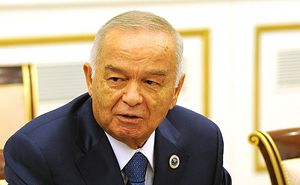With reports of Uzbek President Islam Karimov’s death effectively confirmed, the outlines of the now-former leader’s legacy can begin to take shape. While Karimov can retain credit for leading Uzbekistan through its first quarter-century of independent statehood, the predominance of Karimov’s most notable achievements dovetail directly from the human rights restrictions — and, in certain cases, horrors — rampant under his stewardship. Moreover, his regime and family have managed to not only establish mechanisms of autocracy other post-Soviet autocracies have mimicked, but they’ve managed, over the past few years, to lead a parallel, record-setting campaign of kleptocracy.
To be sure, some of the domestic realities Karimov left behind weren’t necessarily the most appalling internationally, based on available metrics. Rather, they’re merely indicative of the domestic repression brought to bear under Karimov. For instance, while not the worst globally, Uzbekistan under Karimov had both a lower score than Saudi Arabia in Reporters Without Borders’ Press Freedom Index and a worse score in Transparency International’s Corruption Perceptions Index than Zimbabwe. Karimov’s Uzbekistan also found itself among the 17 worst countries internationally for religious freedom, per the U.S. Commission on International Religious Freedom, and, according to the Committee to Protect Journalists, was one of only two post-Soviet countries in the top 15 globally for the total number of journalists jailed. And according to Freedom House — with whom, in the interest of disclosure, I’ve worked in the past — Uzbekistan was not only one of ten nations labeled as the “Worst of the Worst” in 2015, but has received the worst possible score every year since 2006.
But there are metrics and events that allowed Karimov to outpace his authoritarian peers, both regionally and internationally. Due to the country’s cotton industry, the Walk Free Foundation tabulated that Uzbekistan challenged North Korea for the world’s highest rate of domestic slavery, coming in at nearly 4 percent of the population. Karimov’s daughter, Gulnara Karimova, further partook in a record-setting kleptocratic drive, linked to more than $1 billion in bribes. As a result, she’s currently involved in the most substantial case the U.S. Department of Justice has ever opened within its Kleptocracy Asset Recovery Initiative. Karimov’s other daughter, Lola Karimova-Tillyaeva, has also been tied to multiple luxury residences in the United States and at least one shell company. (Karimov also earned another regional record: recipient of the largest single military donation the U.S. had ever offered to Central Asia.)
On the human rights front, it will remain difficult to slip into hyperbole in describing the security state, and attendant suffering, constructed under Karimov’s regime. Not only will Karimov leave behind some 10,000 political prisoners in the country’s fetid jails — prisoners the International Committee of the Red Cross will no longer visit — but he will also leave a legacy of imprisoning opposition figures for improperly wearing slippers and “incorrectly peeling carrots.” And then, of course, there’s the Andijan massacre, one of the largest government-led slaughters since Tiananmen Square . Finally, he’ll have the legacy of having led the only modern regime known to boil dissidents to death.
There are also the little things — the innovations, the pioneering, the tweaks toward authoritarianism that caught on, and spread elsewhere. As Freedom House’s Nate Schenkkan summed,
Much political science attention is now given to how authoritarian governments learn from each other and share techniques, with a disproportionate focus in Europe and Eurasia on Russia as the innovator, spreading ideas like labeling nongovernmental organizations, or NGOs, “foreign agents.” But Uzbekistan was the region’s original pioneer: banning all unregistered religious activity in 1998; expelling nearly all foreign NGOs in 2005-2006; blocking access to social media platforms; kidnapping dissidents and secretly delivering them to prisons; and assassinating exiles in countries as diverse as Sweden and Turkey.
These are some of the highlights — some of the record-setting abominations; some of the neo-Stalinist innovations — girding Karimov’s legacy. Recent prisoner releases have pointed to a slight softening in the regime’s rule, but only barely. Karimov’s successor, whomever he (or she) will be, will inherit a regime whose legacy competes with Ashgabat, Pyongyang, and Beijing in terms of both human rights violations and unabated kleptocracy. While he stewarded a sovereign Uzbekistan through a quarter-century of independence, Karimov managed to entrench a regime — a regime that will remain — whose legacy will come weighted with the memories of Andijan, political decimation, and dictatorial tactics swiped in appreciation by autocrats who looked to Karimov as an example.

































